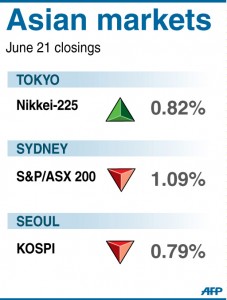Asian markets hurt by muted Fed stimulus

Adding to the selling pressure were preliminary numbers from banking giant HSBC showing China’s manufacturing activity hit a seven-month low in June.
Sydney fell 1.09 percent, or 44.8 points, to 4,087.6 and Seoul gave up 0.79 percent, or 14.97 points, to close at 1,889.15.
Hong Kong tumbled 1.30 percent, or 253.78 points, to 19,265.07 while Shanghai fell 1.40 percent, or 32.00 points, to 2,260.88.
But Tokyo closed 0.82 percent higher, adding 71.76 points to 8,824.07 owing to a slightly weaker yen.
The US central bank said it would extend Operation Twist – selling short-term debt to buy longer-term Treasuries – for another six months and was “prepared to take further action” if needed.
Article continues after this advertisementThe plan is to push down interest rates for borrowers, reducing mortgage repayments.
Article continues after this advertisementHowever, traders who had sent markets higher in Asia on Wednesday in expectation of a third round of monetary stimulus – or quantitative easing – were unimpressed.
The Fed, after a two-day meeting, also predicted US growth would be even worse than thought this year, forecasting 2012 growth of between 1.9 and 2.4 percent – a half point cut from predictions made as recently as April.
Chairman Ben Bernanke also pointed to slower progress in reducing unemployment and to spillovers from Europe’s economic crisis.
“The Fed did the least that was expected, extending Operation Twist until the end of the year, but not altering the size of its balance sheet at all and not – some analysts suggested it might – changing when it thinks it will start raising rates (still late 2014),” said FT Advisors in a research note.
On Wall Street the Dow fell 0.10 percent, the S&P 500 slipped 0.17 percent and the Nasdaq was flat.
The dollar edged up as the Fed’s announcement meant there was no flood of extra cash into the economy. It rose to 79.85 yen in afternoon Tokyo trade, compared with 79.49 yen late Wednesday in New York.
In Beijing HSBC said early figures showed its Purchasing Managers Index, a gauge of nationwide manufacturing activity, fell to 48.1 in June compared with a final reading of 48.4 in May, indicating a sharp slowdown in the economy.
Anything above 50 is seen as growth while anything below is contraction.
The June figure marked the eighth consecutive month that manufacturing has contracted, while new export orders, a component of PMI, recorded their sharpest decline since March 2009, HSBC said, but did not give a figure.
“With external headwinds remaining strong, exports are likely to decelerate in the coming months,” HSBC’s co-head of Asian economic research, Qu Hongbin, said in the statement.
There was some cheer in Europe as a new Greek government coalition of three parties was sworn in and set about planning for talks with the country’s creditors to realign its bailout terms.
But eyes are also on Spain where borrowing costs remain elevated amid fears the country will follow Greece, Ireland and Portugal in needing a bailout as it struggles with record unemployment and a huge deficit.
The yield on Spanish benchmark 10-year government bonds soared to a record high above 7.2 percent earlier this week but late Wednesday was a little over 6.8 percent, although that is still regarded as unsustainable in the longer term.
Madrid was also due later in the day to make a formal request for a bailout of up to 100 billion euros ($127 billion) to save banks laden with bad loans extended during a real estate bubble that imploded in 2008.
The euro was at $1.2665 and 101.43 yen in European trade from $1.2702 and 100.97 yen in New York.
Crude prices fell in Asian trade, with New York’s main contract, light sweet crude for August delivery, shedding $1.23 to $80.22 a barrel and Brent North Sea crude for delivery in August retreating $1.37 cents to $91.32.
Gold was at $1,586.50 an ounce at 1245 GMT, compared with $1,606.90 late Wednesday.
In other markets:
— Mumbai ended up 0.8 percent, or 135.93 points, at 17,032.56.
ICICI Bank rose 2.1 percent to 850.55 rupees, and State Bank of India ended 2.9 percent higher at 2,177.95.
— Singapore closed down 0.89 percent, or 25.53 points, at 2,830.15.
City Developments fell 0.65 percent to Sg$10.71 and Fraser and Neave shed 1.43 percent to Sg$6.90.
— Taipei fell 0.76 percent, or 55.58 points, to 7,279.05.
Smartphone maker HTC fell 2.81 percent to Tw$380.0 while TSMC was 1.23 percent lower at Tw$80.6.
— Manila fell 0.72 percent, or 37.03 points, to 5,109.43.
SM Investments dropped 2.11 percent to 695 pesos while Megaworld rose 2.88 percent to 2.14 pesos and Alliance Global added 0.17 percent to 11.98 pesos.
— Wellington closed 1.03 percent, or 35.40 points, lower at 3,409.39.
Telecom fell 2.22 percent to NZ$2.425, Fletcher Building slipped 2.90 percent to NZ$6.03 and Air New Zealand was steady at NZ$0.86.
— Jakarta fell 1.07 percent, or 42.11 points, to 3,901.79.
Gas distributor Gas Negara fell 4.3 percent to 3,375 rupiah, nickel and gold miner Aneka Tambang slid 2.9 percent to 1,350 rupiah and Astra International lost 2.21 percent to 6,650 rupiah.
— Kuala Lumpur eased 0.18 percent, or 2.96 points, to 1,601.43.
YTL Corp lost 1.9 percent to 2.08 ringgit and MMC Corp eased 1.4 percent to 2.81 ringgit while Petronas Dagangan added 0.8 percent to 21.80 and YTL Power International rose 0.6 percent to 1.74 ringgit.
— Bangkok fell 1.21 percent, or 14.19 points, to 1,159.05.
PTT fell 3.31 percent to 321 baht and Banpu lost 2.59 percent to 452 baht.